5-19-13
Isabel Allende and Dulce Rosa:
“I Want to Be the Girl — Aida, Tosca —
But I Can’t Sing in the Shower”
By Diane Sippl
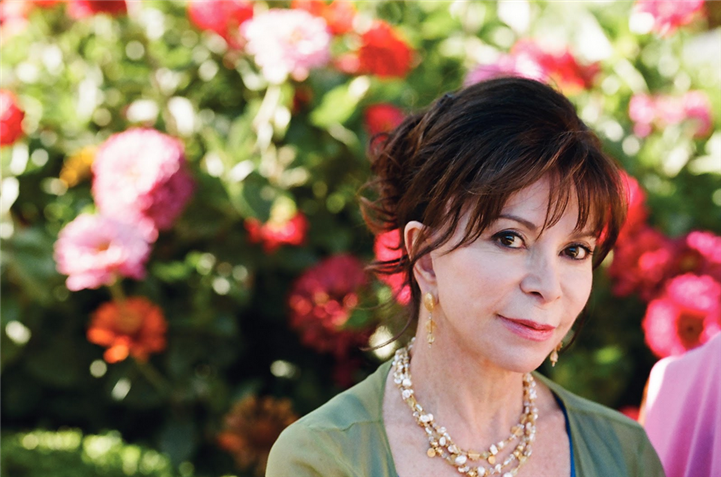
When Isabel Allende took her seat in front of nearly a houseful of opera fans for a pre-show talk just before the opening night of the world premiere of Dulce Rosa at the Broad Stage in Santa Monica on May 17th, host Duff Murphy of Classical KUSC introduced her as the most widely read author in the Spanish language today, with her 20 books translated into 30 languages and yielding sales of over 57 million copies.
Her short story of less than ten pages, “Una Venganza” (“An Act of Vengeance”), was the source and inspiration of the opera written and directed by librettist Richard Sparks with music composed by Lee Holdridge, commissioned and presented by Plácido Domingo, The Eli and Edythe Broad General Director of LA Opera. Maestro Domingo conducts the production featuring the LA Opera Chorus and Orchestra, on the occasion of launching, with Dulce Rosa, a new series of works in the project, “LA Opera Off Grand” (that is, far from the Dorothy Chandler Pavilion at the Music Center in downtown Los Angeles) in order to take opera to local neighborhoods and to introduce both new works and new talent to the community and opera lovers everywhere.
Isabel Allende spoke of the genesis of her story, of creating male and female characters, of history and politics, of feminism, of magical realism and her unique approaches to the writing practice, and, finally, of opera. What follows is my edited version of her discussion.
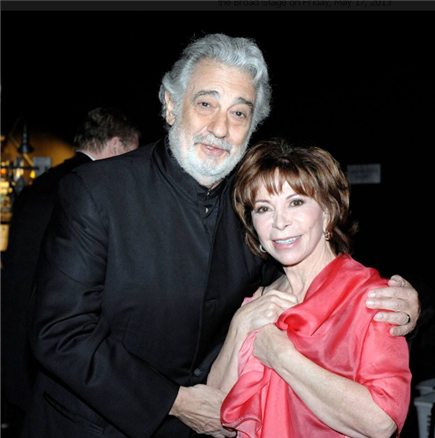
My characters are not in my head. When I’m writing, they come to life and invade my studio. For me they’re always people.
I have only one collection of stories, and that’s because at the time that I wrote it, I had no space to write something longer. This story was written in 1987 when I met an American lawyer on a book tour and fell in love and came to the United States. With a short story, the difference is you can write it in your car, and that’s what I did.
In almost all my works there are very strong female characters — some old, some young. The truth is, I don’t know any weak women characters. I’d have to look for them. I work for a foundation for women like Rosa who have been raped, violated, so I don’t have to invent these characters. I just listen.
When I left Chile, by 1973, almost all of Latin America was living under some kind of oppression, backed by the CIA, by the way. If I’d stayed there, I’d probably be a journalist, and a very busy one.
I became a writer because of all I lost. I needed to tell those stories.
If I had to choose, I’d always write a novel, 800 pages even. A short story is an arrow: it needs speed; you get one shot — and if you overwork it, it loses its freshness.
The military coup in Chile and the death of my daughter are the only two events that absolutely changed my life. The coup happened on a Tuesday, September 11th, just like the 9-11 here, only in 1973. Also coincidentally at that time, there was a case in Stockholm in which thieves robbed a bank and kept the captives in the vault, then released them. I always wondered how they could become emotionally attached to their victims.
Then I wrote a play about a kidnapped ambassador in which the perpetrator can’t kill him because he gets too close to him as a hostage. Other examples involve the victims of military sergeants, anyone battered, by bullies in schools, in romantic couples. Why do victims fall in love with these oppressors? It’s called the “Stockholm Syndrome,” and it happens all the time with trauma psychosis.
There is forgiveness, then tragedy, in the opera Dulce Rosa. In my story, “Una Venganza,” revenge is more important than forgiveness. Rosa promises her father she’ll live only for revenge, and now her heart has forgiven and she falls in love, so she feels torn — so she kills herself. So she honors her promise to her father and at the same time gives revenge to the perpetrator in the worst way. He’ll be remembering her ‘til he’s ninety.
My ending is better, but it doesn’t work for the theatre, because it’s left open, and it needs to be clear on the stage.
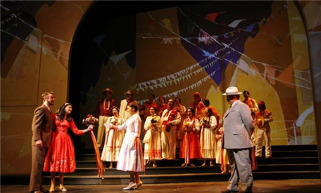
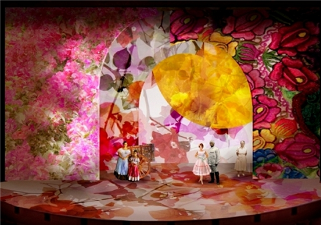
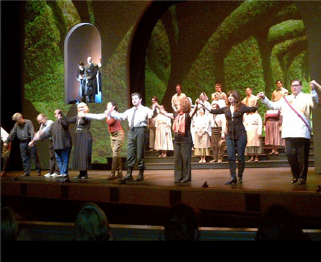
Once the story is published, it
doesn’t belong to me. I can’t tell the
readers or the audience how to interpret my writing. So I can’t lose: if the opera is
bad, people will say, ‘the book is better — read the book’. If the opera is good, people will want to
read the story behind it. I’m here
panting — in Spanish!
I write what I like to read. My readership is women of all ages — and young men in college, who are forced to read my books!
One male character keeps coming back: an older man, protective, a grandfather, reappears. The fathers in my works are mostly absent, dead, or abusive. I didn’t have a father myself. The men in my works are astronomers, doctors, politicians — older men, models.
I just wrote a thriller (I don’t usually write them) and now it’s about a Navy Seal — I had to look for this model.
My neighbor in Marin County knew one, and we became friends over wine and photos, and I could really see his thinking, his values. My husband retired as a lawyer years ago and decided he’d write novels. (I should take up law when I retire!) He’s written six, and they are crime novels (to my chagrin). His attention span is 11 minutes, and mine is 11 hours, so we couldn’t write together, so I started my own. It was wonderful to cut the body up in pieces and hide them separately, one by one!
To me language, story, the development of characters are all important, so I write slowly. Usually I’m not in the book, but the things I care about and believe in are there.
I’ve written memoirs, young adult novels (a trilogy), historical works, even a cookbook, but no erotic novels, because my mom is still alive.
For Maya’s Notebook (El Cuaderno de Maya), my latest book, (2011), which takes place in southern Chile and in California, the inspiration was my grandchildren, though they don’t read my books. They’re extremely embarrassed to have me as a grandmother. They end up getting to know my books only when they’re forced to because they are assigned as reading in school. By the way, I had the same problem with my son.
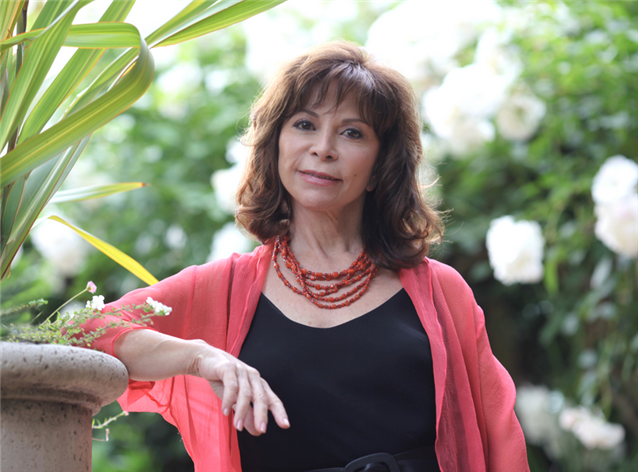
City of Joy is a shelter where women help other women heal the soul, become leaders, and confront and change their world, and stop hate.
U.S. feminism was more aggressive and more radical than Latin American feminism, because we got it later. I was in the transition era, the start of feminism in Latin America. It wasn’t so much like a war against men as it was a struggle to change the society, the laws.
In Latin America we’ve made progress, but in other places in the world, girls are still sold, forced into labor or armies, exploited, raped, abused, tortured. Yet it’s called ‘culture’, when in reality it’s a violation of human rights. One million women in the Congo have been gang raped; it’s a political tool of war, genocide. There are little girls who won’t ever walk again.
All operas are about the girl. I want to be the girl — Aida, Tosca…
‘Magical realism’ is a label stuck to Latin American literature, and we forget it’s been used all over the world: Scandinavians have used it, Salman Rushdie, Toni Morrison. It’s always been used, because we can’t explain and control everything, and the rest is magical.
I start all my books on January 8th. You’d say it’s magical realism and I’d say it’s discipline. It’s the perfect time of the year to start writing.
I met Plácido Domingo at the time of the 1985 earthquake in Mexico when Plácido lost part of his family and was raising funds for victims. On TV, the President of Mexico asked him what he was reading. He said, ‘The House of the Spirits’. Then he was reading my second novel, and I told him I’d like to be in one of his operas. He said, ‘Okay, you can be a slave in Aida’. But I can’t sing in the shower.
Isabel Allende’s short story, “Revenge” was published with 22 others in English, translated by Margaret Sayers Peden, in 1991 by Atheneum (Maxwell Macmillan International), in New York, Oxford, Singapore and Sydney, under the title, The Stories of Eva Luna.